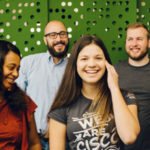
Cat Bui is a Cisco Intern on the Strategy & Innovation team, under Data & Analytics from Virginia Tech.
Coming into Cisco as an intern – I wasn’t sure what to expect. With so much going on in the world today – I was worried that perhaps the response, culture, or drive might not hold up as America faced overarching racial inequalities.
And, yet, I’m proud to say that Cisco went above and beyond to not only address these issues directly (they donated $5 million to anti-discriminatory organizations to help eradicate systemic racism and inequality), but they also invited special guests and advocates to discuss the racism and inequality that still exists today.
For example, on June 1st Darren Walker, president of the Ford Foundation, and Bryan Stevenson founder and executive director of the Equal Justice Initiative and author of Just Mercy (which was made into a movie in 2019) joined our weekly Check-In to offer their first-hand perspectives and guidance for supporting one another. While the following week had Helen Zia, an Asian American LGBTQ+ activist join us for a powerful conversation around discrimination and taking positive action for social change.
These powerful conversations also brought up another topic – when most think of discrimination, they think of people discriminating people. However, machines can certainly discriminate in harmful ways, and often it starts with the terms used within many industries – including technology.

Controversial tech-related terminology, like “master” and “slave” or “whitelist” and “blacklist” have been sitting in the tech library for decades. And many companies, including Cisco, are working to replace these words. Quite simply, words matter. And Cisco isn’t just talking the talk on empowering an inclusive future for all – we’re also walking the walk.
During a recent Cisco Check-In (our weekly to bi-weekly virtual all company meeting that was created in response to 2020’s unprecedented times) our CEO Chuck Robbins said, “In regard to the words we use – these are just things that have been around for forever that we have to eliminate. So, our teams are working diligently right now to change it all.”
But that is just the beginning.
As an intern on the Strategy & Innovation team, under Data & Analytics, I had the opportunity to talk to nonprofits and startups about how their technology can change not only the way we work at Cisco, but how we can change the world together. One of my first tasks was to research and investigate artificial intelligence (AI) ethics.
To give a brief overview, AI ethics are crucial to avoid biased outcomes within technology. Since we’re designing these machines to make data-driven decisions, it is important to produce fair and equal outcomes; however, it isn’t as easy as it sounds.
I found that nonprofits focused strictly on AI ethics and many represent underrepresented individuals and communities that are unfulfilled by the government and businesses. And, in conclusion, there needs to be an ethical framework in place before the adoption of artificial intelligence comes into play.
It brought up the question – who trains the data, and how do they approach the topics that matter most to the organization?

The unethical use of algorithms to train these machines can cause major controversies within criminal justice, education and healthcare systems. It’s alarming, but with the help of major tech companies, like Cisco, we can create a more inclusive society by partnering with these nonprofits to focus on creating an ethical AI framework that works for everyone.
I also had the opportunity to collaborate on a side project with my mentor, Gina Grino, on an Anti-Racism course that will help to provide resources to educate those on racial injustice. This set of resources is curated to include and amplify melanated voices and include in-depth education for those who wish to learn more.
Even during my virtual internship, I have never felt more connected and am proud to work for a company with such an inclusive culture that continues to drive awareness and action around diversity. For all that I have learned and the contributions I have been able to make that will help Cisco create an inclusive future for all – I am proud to say that Cisco is a leader, not just in technology, but in truly changing the world.
Ready to empower an inclusive future for all with us? Apply now.
Subscribe to the We Are Cisco Blog


Go Hokies!
Love it. Let’s Go…!
Great article! I look forward to the follow up article about how the algorithms can be corrected. This will help me as a vendor manager identify indicators or false positives when evaluating suppliers, vendors, and partners.